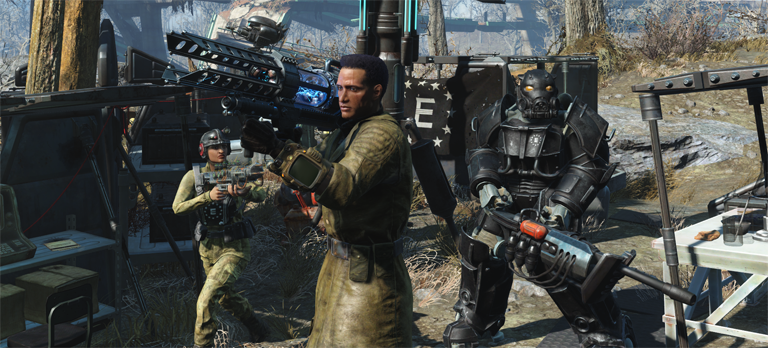Growing up with a single AC/DC tape to my name (Razor's Edge), I was never aware that the band was on its second vocalist. Naturally, I'd heard other songs but – to my untrained piggy ear holes – it just sounded like the compositions got a little tighter: the vocalist and the general vibe felt the same.
Part of this can be chalked up to the fact that I didn't get into music (appreciating it vs. just listening) until I was much older, but the other – much more pertinent bit – was that Angus and Malcolm understood branding: if you spent seven years shaping a band's identity and your vocalist died but you wanted to keep playing, you had to keep the band's "band-ness" intact.
So they picked Brian Johnson for a replacement (whom Bon Scott admired and who could approximate the late vocalist's range and timbre); and shifted their tone out of the blues-y, traditional rock of the Scott-era into something more along hard rock lines, but — kept everything else intact. They got to keep playing, the fans were happy and the institution that is AC/DC continued its raucous existence to this very day...
And if computer game studios could follow an Australian rock band's example, I wouldn't be writing this article today.
Sadly, the current process of IP acquisition seems to run along the lines of 1) buy the IP and acquire an existing fanbase; 2) make something tangentially related to past games in the series; 3) laugh all the way to the bank.

We've seen this with EA/Starbreeze's "revamp" of Syndicate (which turned a beloved isometric tactical shooter into a souless FPS); Bethesda's acquisition of Fallout (which turned a beloved isometric RPG into a souless— wait a minute!); Paradox gobbling up White Wolf (which, hilariously, nine years, countless firings and three studios later, has still not resulted in Bloodlines 2); Larian making Divinity: Original Sin 3, but calling it Baldur's Gate; or even Altar Interactive buying an unfinished Julian Gollop project to "refine" it into UFO: Aftermath, which was (somehow) worse than X-Com despite, basically, being its carbon copy.
The nature of the trend is pretty easy to understand: as game development has become more commercial and the objective of forming a studio or undertaking a project gradually shifted away from "making a good game" to "turning a profit" all of the weaselly tactics adopted by movie studios (such as the endless parade of prequels and spin-offs) and other businesses have seeped into gaming. If turning a profit is your first (or only) goal then having a built-in audience on day one of development can't help but aid your aim.
What Studio Execs of a Certain Stripe can't seem to grasp, however, is that audiences invested into an IP aren't necessarily after Something New. If you like an IP for a particular game or feature, having it changed into something entirely different isn't gonna turn you into more of a devoted fan...
A facet of IP subversion that compounds the issue (or, at the very least, exists in parallel to it) is that – oftentimes – devs find themselves in a no-win situation because of Limitations from On High imposed by publishers, financiers or other stakeholders.
If you're Larian or Bethesda, buy an IP outright and then decide to take it in an odd direction, that's one thing. But if you specialize in making multiplayer FPS games, have been yearning for a Gears of War project of your very own and are then told "oh, yeah: and make it a turn-based strategy" (as in the case of Splash Damage's underwhelming Gears Tactics); the result isn't likely to blow anybody's socks off.

Likewise, a publisher (Paradox) expecting the sales of a game (Lamplighters League) to exceed past releases after a studio's (Harebrained Schemes) principal sauntered away following the sale of his company is simply delusional. If the past four games (which sold well) were down to IPs created by a single individual who is no longer there then any new game will be an Unknown Quantity. I'm a pig – not a veteran game publisher of 25 years with a 176 million USD revenue – but even I get that...
Entrenched and, to be honest, effective as they are, these shenanigans aren't likely to go away anytime soon. Buying an IP and using its pedigree to peddle a dissimilar product is as old as – well, XCOM Declassified, at least – and, collecitvely speaking, human consumers are hardly what I'd call a discerning bunch: enough of 'em usually buy into IP subversion to warrant some return on investment.
On an individual basis, however, the next time Disney excretes yet another Star Wars spinoff onto a streaming service (trotters crossed for Star Wars: Custodians – a gritty insight into the daily lives of people who keep imperial bases looking so neat and tidy); Bethesda churns out the next drab "reimagining" (bold quotes for heavy sarcasm) of the Fallout formula or post-Weiland Stone Temple Pilots release an album that sounds more like musak than delectable grunge, take some time to decide if an IP itself is enough of a reason to spend money on a substandard product.
